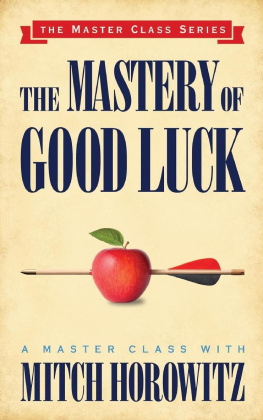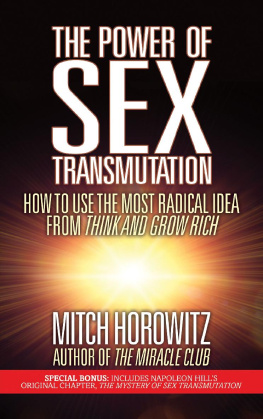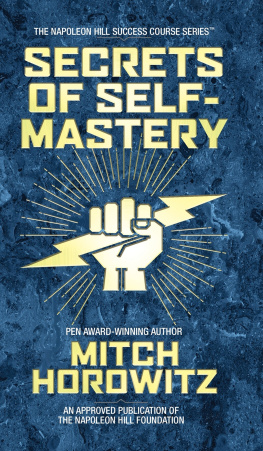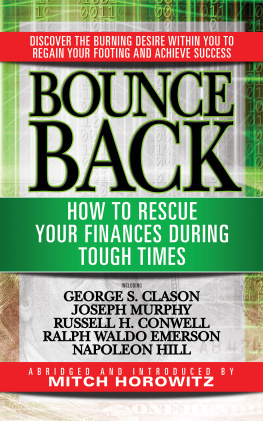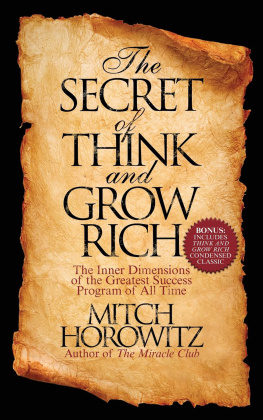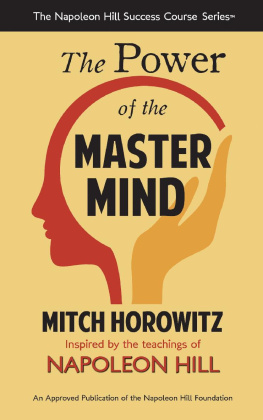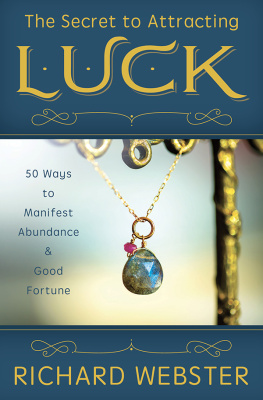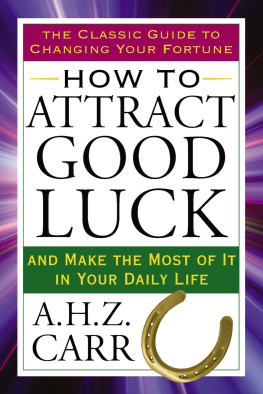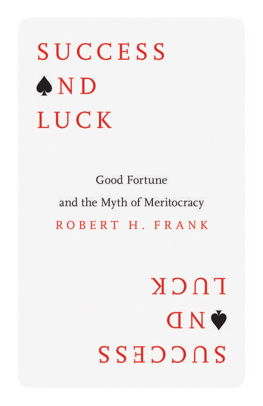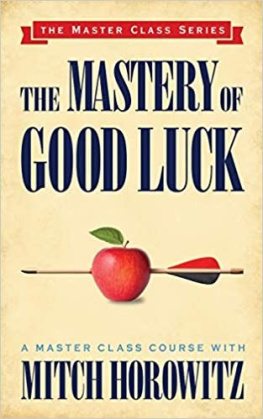
The Mastery of Good Luck
The Master Class Series
Awakened Mind
Miracle
The Mastery of Good Luck
The Science of Getting Rich Action Plan
The Master Class Series
The Mastery of Good Luck
A MASTER CLASS COURSE WITH
Mitch Horowitz

Published 2019 by Gildan Media LLC
aka G&D Media
www.GandDmedia.com
THE MASTERY OF GOOD LUCK. Copyright 2019 by Mitch Horowitz.
All rights reserved.
No part of this book may be used, reproduced or transmitted in any manner whatsoever, by any means (electronic, photocopying, recording, or otherwise), without the prior written permission of the author, except in the case of brief quotations embodied in critical articles and reviews. No liability is assumed with respect to the use of the information contained within. Although every precaution has been taken, the author and publisher assume no liability for errors or omissions. Neither is any liability assumed for damages resulting from the use of the information contained herein.
FIRST EDITION 2019
Interior design by Meghan Day Healey of Story Horse, LLC
Library of Congress Cataloging-in-Publication Data is available upon request
ISBN: 978-1-7225-0168-6
eISBN: 978-1-7225-2139-4
10 9 8 7 6 5 4 3 2 1
Contents
Introduction
The 13 Rules of Good Luck
Welcome to the Master Class Series. Each of these courses teaches you, in a series of simple, straightforward lessons, how to benefit from the powers of thought and gain a new understanding of the inner workings of life.
The lessons in this program are designed so that you may listen to one a day, all of them at once, or in whatever configuration you want. Where action steps are given, perform them in your own time and at your own pacebut it is crucial that you do them. This series supplies hands-on philosophy.
The Mastery of Good Luck contends that luck is not mere blind chance but rather is a network of causative factors that can be identified and cultivated. As an intriguing book called The Kybalion once put it: Chance is merely a term indicating cause existing but not recognized or perceived.
This program shows you how to identify those causes and bend them to your own needs and ends. This is not a book for gamblers but for those who want to align themselves with fortune in the overall game of life.
The lesson plan consists of 13 Rules of Good Luck. In brief, the rules are:
1. Luck is learnable.
2. Good chemistry is powerfully lucky.
3. To be lucky you must be noticed.
4. Prepared minds win.
5. Sobriety is lucky.
6. Persistence beats odds.
7. Failure can be lucky.
8. No is not always the final answer.
9. Enthusiasm and pessimism are a lucky combination.
10. Humiliating people brings bad luck.
11. Recognizing others improves luck.
12. You must help fate find you.
13. Lucky people are decisive.
The final section, The 13 Aphorisms of Good Luck, reviews each rule for reference.
This class, and all of the programs in the Master Class Series, is designed to provide you with a new estimate of yourself, and with the tools to fulfill your highest possibilities.
Rule
ONE
Luck Is Learnable
A neurosurgeon once told me never to take notions of luck lightly. Ive seen many patients live or die on an operating table, he said, based on what we call luck.
Yet we have difficulty saying what luck really is. Good or bad luck could be seen merely as an accident. But is anything truly accidental when the law of cause-and-effect is detectable behind every event, even if only after the fact? Seen a certain way, we are able to cultivate and improve our luck. Obviously no one can control the myriad and vast factors behind every occurrence. Yet I have observed that certain practices and habits regularly improve good luck or, put another way, sway circumstances in someones favor. This is true even if the recipient is unconscious of whats happening. Hence, the personal factors that trigger luck should always be respected, considered, and, whenever possible, cultivated.
A famous actor told a friend of mine his key to success: Determine the things that make you lucky, and then do more of them. Implicit in his statement is the belief that certain identifiable actions, habits, personal traits, and environments are, by their nature, lucky. I not only embrace that view but I believe that many luck factors can be distilled into general rules applicable to nearly anyones life.
I approach the topic of luck not as a statisticianalthough laws of odds and statistics play a part in itbut rather as a thirty-year media veteran who has observed people across a wide range of fields rise, fall, or experience inertia based on the 13 Rules explored in this program. I believe that talent and cognition matter; but I have observed, again and again, that pivotal events in peoples lives, and sometimes the arc of their entire adulthoods, result from the presence or absence of the practices and disciplines youll find here. If followed, these practices place motivated people into the current of destiny, or the flow of good luck.
Filmmaker David Lynch recalled that when he attended art school in Philadelphia he was interested in painting not in making movies. But he began to see film as a kind of moving painting, and his interests began to shift in that direction. At a certain point he had to decide which medium to commit to. How do you know where to dedicate your energies? Watch for those green lights, he said. Look for where youre getting the most encouragement, satisfaction, and opportunities. But, simple as it sounds, the green lights are not always plainly evident. Sometimes you may not feel that youre even getting any. These lessons not only help you identify the green lights but also help you position yourself in the places where they occur. This is because of the basic but neglected fact that luck is learnable.
Rule
TWO
Cultivate Chemistry
A persons core decision in life, observed Italian novelist Ignacio Silone, is the choice of comrades.
The company you select plays a tremendous part not only in the values you live but also in the opportunities that you experience and the nature of what you do.
In 2010, this topic arose, albeit without full illumination, when rock legend Mick Jagger spoke to interviewer Larry King:
KING: How do you account for the longevity of the Stones as a success?
JAGGER: Well, I think the Stones are very lucky. You always need a lot of luck. And I think they were in the right place at the right time. And when we work, we work very hard. So I think you need all those things. You know, theres no good just being hardworking because lots of people are hardworking. But youve got to be hardworking, on your game and be lucky
KING: Dont eliminate the word luck.
JAGGER: No, Im not eliminating luck whatever your way of life, if you get to be very successful there is usually some point where you just happen to be lucky.
One of the factors that Jagger did not mention, at least specifically, is the luck of good chemistry. Part of the Rolling Stones success is that they gelled extraordinarily well as musicians, writers, performers, and in personal image and looks. They have functioned uniquely well as a group. By contrast, Jagger, a virtuoso performer and brilliant businessman, actually has a spotty record with his solo albums, despite enormous resources, fame, and talent placed behind them. His chemistry with the Rolling Stones is singular; it cannot be duplicated in other parts of his career.
Next page
